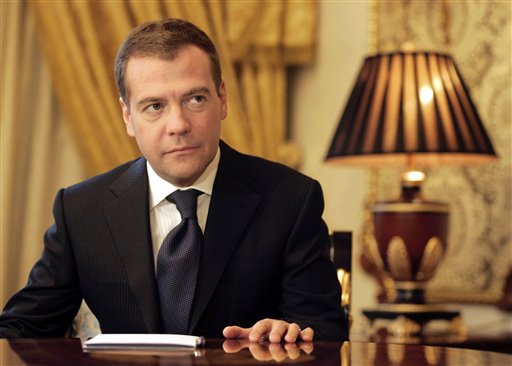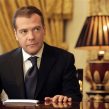
MEDVEDEV’S FOREIGN POLICY TAKES INDEFINITE SHAPE
Publication: Eurasia Daily Monitor Volume: 5 Issue: 138
By:

President Dmitry Medvedev, after completely ignoring foreign policy issues on the election trail, has performed a high-intensity campaign of visits, speeches and meetings since late May, wrapping up this season last week with the adoption of a new Foreign Policy Concept. Sycophants are trumpeting the success of this “instant offensive” but cutting through the exuberant praise, it is possible to make a preliminary evaluation of Medvedev’s achievements and setbacks (Rossiiskaya gazeta, July 18; www.gazeta.ru, July 17).
The flurry of external activity was centered on two seemingly incompatible tasks: to demonstrate consistency with Putin’s course, and to show that the current president is firmly in charge of charting a new one. Other than confirming that oil and gas are the alpha and omega of Russia’s policy, the first task has the problem that its key goals are rather indistinct. The urge to raise Russia’s profile does not constitute a goal in itself, so the desire to have a say in things runs ahead of having something to say. Putin in his last year used loudly aggressive speech and rattled every saber in Russia’s arsenal to get attention; Medvedev has tempered the rhetoric and got attention for free but has not moved forward one inch in resolving any of the urgent problems, from Kosovo to Georgia and from Sakhalin to Sevastopol.
As for the second task, Putin, after making a “royal” visit to France in mid-May, has tactfully stepped away leaving the international arena entirely to Medvedev to play upon. Lacking experience, Medvedev has not been able to gather his own team of experts, so the revisions to the Foreign Policy Concept were penned by Putin’s trusted aids, including Sergei Prihodko. Logically, new versions of the National Security Concept and, perhaps, the Military Doctrine should appear soon (both documents were approved in 2000), but the Security Council under Nikolai Patrushev, former director of the FSB, does not seem to function all that efficiently. Every week, Medvedev holds a meeting with several permanent members of the Security Council, but there is neither a substantial agenda nor a visible output, and Putin often does not attend.
Overall, Medvedev’s introductory meetings went smoothly; the only bad mistake happened at the G8 summit at Toyako, Japan, where Medvedev agreed on sharp criticism of the regime in Zimbabwe but then authorized a veto on a resolution punishing Zimbabwe in the UN Security Council (Vedomosti, July 16; Moscow echo, July 19). Two other particular tests that Western counterparts have set for him, the corporate conflict in the TNK-BP oil company and the abrogation of the verdict against Mikhail Khodorkovsky, have brought inconclusive results, as Medvedev has resorted to lawyer’s language to buy himself more time (Nezavisimaya gazeta, July 17; Moscow echo, July 18).
Reinforcing Putin’s priorities, Medvedev has gone to great length to demonstrate that his prime attention is given to the member states of the Commonwealth of Independent States (CIS), despite the incurable feebleness of this organization (Vremya novostei, July 16). Russia has, in fact, little interest in cultivating integration processes in the post-Soviet space, and the so-called “Common Economic Space” with Belarus, Kazakhstan and Ukraine was not even mentioned in the new concept. Relations with Ukraine remain deadlocked as Moscow cannot find a significant strategy for playing on the differences between President Yushchenko and Prime Minister Tymoshenko, beyond opposing Kiev’s rapprochement with NATO. The ill-designed project for a “Union state” with Belarus is officially at a standstill; and, in fact, the lines have already been drawn for the next round of the “gas war” between Moscow and Minsk (www.polit.ru, July 17). The strategic partnership with China is so weakened by Russia’s failure to increase energy exports that Medvedev had to authorize the transfer to China of two disputed islands on the Amur River, a step that is certain to meet with public disapproval (Vremya novostei, July 18; Moscow echo, July 19).
The Eurocentrism of Medvedev’s world view has manifested itself quite clearly in his attempts to cover all the angles, but the only success in this direction, the opening of negotiations on a new partnership agreement with the EU, was not of his making but came out of a bureaucratic compromise finally ironed out in Brussels. Even if a sufficiently low common denominator for a short uncontroversial text could be found, the deeply eroded trust could hardly be restored; and Medvedev’s sincerely hostile stance on the Kosovo issue has confirmed the impression that Moscow expects Europe, as the more interested party, to travel an extra mile in every deal (Rossiiskaya gazeta, July 2, 16). It is hardly surprising that his grand initiative on signing a non-aggression pact and setting a new all-European structure that would substitute for the OSCE has fallen flat.
If there is a slight difference with Putin’s vision, it is in the United States occupying a less prominent place on Medvedev’s mental map. His anti-Americanism also has a particular quality, perhaps reinforced by being called “smart guy” by President George W. Bush (Nezavisimaya gazeta, July 8). While he reiterates firm opposition to the planned deployment of U.S. strategic defense systems in Poland and the Czech Republic, strategic matters generally are of less interest to him, so he argues for expanding the format of arms control negotiations from bilateral to multilateral. The main avenue of his attack, however, is based on the argument that the United States is responsible for the unfolding crisis of the global financial system, which has to be reconfigured in such a way that the U.S. dollar would be stripped of its role as the universal currency.
Another minor departure from Putin’s guidelines is the surprisingly little attention paid to Iran in the new concept and in Medvedev’s activities. He did have a telephone conversation with Mahmud Ahmadinejad last week, but Moscow remains an idle observer in the latest attempt of the European “troika” to break the deadlock around the Iranian nuclear program accompanied by diplomatic signals from the United States (www.gazeta.ru, July 19).
Medvedev may feel satisfied with his self-introductions to peers and partners, but his politeness and skill in talking himself out of trouble have only prolonged his trial period. He is a perfect spokesperson for those of Putin’s followers who seek more recognition in the West; others, however, thrive on conflict and feed on insecurity. They are also testing Medvedev, and Putin can shield him only so far.




